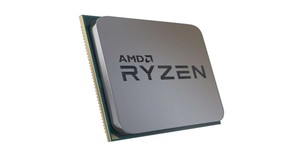
Details of AMD's first Zen-architecture accelerated processing unit (APU), a design aimed firmly at the high-performance computing (HPC) and server sector, have leaked with the promise of up to 32 threads and 16GB of graphics-accessible RAM.
AMD's biggest chip release for quite some time, Zen could be make-or-break for a company which has been floundering for years. AMD has already confirmed plans to release HPC-centric APU designs based on the Zen architecture, but had stopped short of offering specifications - at least, in public. A slide obtained by Fudzilla, however, claims to reveal the company's top-end Zen part: a 'stream processor' aimed at high-performance computing and boasting impressive specifications.
The slide, the source of which the site has not revealed, features up to 16 Zen-architecture x86 processing cores, supporting two threads per core for a total of 32 threads - AMD's first attempt at an equivalent to Intel's HyperThreading technology. Each core has 512KB of L2 cache, while a 32MB shared L3 cache provides coherency for the platform - a major string to the company's Heterogeneous Systems Architecture (HSA) bow, which promises to do away with the divide between graphics RAM and system RAM. A cryptographic co-processor is also promised, along with support for Secure Boot.
As an APU, the unnamed part also features embedded graphics - or, to better appeal to the HPC crowd, a 'stream processor.' Codenamed Greenland, this promises support for up to 16GB of High-Bandwidth Memory (HBM) running at a throughput of 512GB/s directly on the interposer. The memory is, naturally, HSA-compliant, and can be used as a high-speed alternative to system RAM - of which four-channels of ECC DDR4 are supported, with a total capacity of 1TB. The chip also includes 64 lanes of PCI Express Gen. 3, 16 of which can be switched to two-lane SATA Express or 14 lanes of plain-old SATA connectivity.
AMD, as is to be expected, is remaining silent on the leak, and has not commented publicly on the validity of the slide or the veracity of the specifications presented therein. Should it prove accurate, however, one thing is clear: the first Zen chip out of the gate is going to be an absolute beast.
AMD's biggest chip release for quite some time, Zen could be make-or-break for a company which has been floundering for years. AMD has already confirmed plans to release HPC-centric APU designs based on the Zen architecture, but had stopped short of offering specifications - at least, in public. A slide obtained by Fudzilla, however, claims to reveal the company's top-end Zen part: a 'stream processor' aimed at high-performance computing and boasting impressive specifications.
The slide, the source of which the site has not revealed, features up to 16 Zen-architecture x86 processing cores, supporting two threads per core for a total of 32 threads - AMD's first attempt at an equivalent to Intel's HyperThreading technology. Each core has 512KB of L2 cache, while a 32MB shared L3 cache provides coherency for the platform - a major string to the company's Heterogeneous Systems Architecture (HSA) bow, which promises to do away with the divide between graphics RAM and system RAM. A cryptographic co-processor is also promised, along with support for Secure Boot.
As an APU, the unnamed part also features embedded graphics - or, to better appeal to the HPC crowd, a 'stream processor.' Codenamed Greenland, this promises support for up to 16GB of High-Bandwidth Memory (HBM) running at a throughput of 512GB/s directly on the interposer. The memory is, naturally, HSA-compliant, and can be used as a high-speed alternative to system RAM - of which four-channels of ECC DDR4 are supported, with a total capacity of 1TB. The chip also includes 64 lanes of PCI Express Gen. 3, 16 of which can be switched to two-lane SATA Express or 14 lanes of plain-old SATA connectivity.
AMD, as is to be expected, is remaining silent on the leak, and has not commented publicly on the validity of the slide or the veracity of the specifications presented therein. Should it prove accurate, however, one thing is clear: the first Zen chip out of the gate is going to be an absolute beast.

MSI MPG Velox 100R Chassis Review
October 14 2021 | 15:04








Want to comment? Please log in.